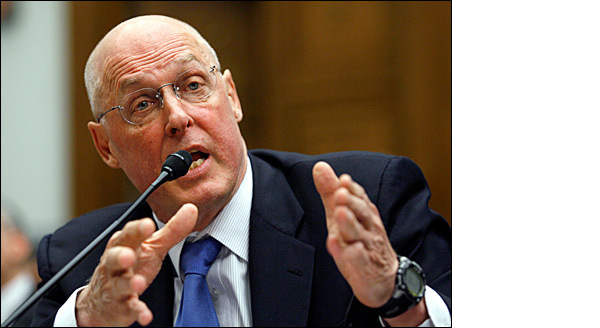
Former U.S. Treasury Secretary Hank Paulson said Tuesday morning, “A ‘business as usual’ approach is actually radical risk taking.” If American business does not mitigate climate change now, it can’t decide to get rid of all the greenhouse gases in the atmosphere later. The fact that carbon dioxide doesn’t go away once it’s been emitted is what leads Paulson to call the risks of climate change “much more perverse and cruel than we saw with the financial crisis.” The government can bailout banks, there’s no comparable opportunity for an atmosphere bailout.
Paulson was speaking upon the release of “A Climate Risk Assessment For the United States,” a report by the Risky Business project, a group formed to evaluate the economic risks of climate change in the United States. Risky Business is chaired by Paulson, hedge fund manager Tom Steyer, and former Mayor Michael Bloomberg.
[pullquote align=”right”]The risk and impact of climate change is more cruel than the financial crisis — Paulson[/pullquote]Tuesday morning, Bloomberg referenced the saying, “If you can’t measure it, you can’t manage it.” He explained that until today there was no way to measure the serious risk posed to our economy. The report quantifies the economic threat of climate change, estimating the annual cost of hurricanes and other coastal storms to be $35 billion within the next 15 years, that between $60 and $106 billion of existing coastal property will be below sea level by 2050, a decline of national commodity crop production (corn, soy, wheat, cotton) of 14 percent by mid-century and up to 42-percent by late century, and increased heat-related mortality with ll,000 to 36,000 more deaths annually in the Southeast alone by the end of the century.
The report presents only the average consequences of not acting on climate change. Committee members Robert Rubin, also a former U.S. Treasury Secretary, and Alfred Sommer, the former Dean of the Bloomberg School of Public Health at Johns Hopkins, stress that it’s important to remember the tail-ends of the threats evaluated in the report. Rubin said that the report “vastly understates what we face” due to unpredictable feedback loops.
Yet, even the averages presented in the assessment are harrowing, and the team hopes that they encourage American businesses to prepare for and mitigate climate change. Paulson said that, “If we act immediately, we can avoid the very worst outcomes.” This will not only prevent future harm to the American people, but act as insurance for the future profits of corporations. Bloomberg also pointed out that today CEOs are being held accountable for a wide variety of factors, and suggested that if they don’t prepare for the worst-case climate scenario, they should prepare for retirement.
[pullquote align=”left”]Companies should inform investors about emissions they might be accountable for in the future[/pullquote]Paulson explained that the bipartisan group formed to agree on the nature of the problem, not to decide on one solution to the problem. They do acknowledge the need for both corporate and political action, and believe that the calculation of a company’s value should include how they are responding to climate change. “This study is basically about quantifying reality,” Steyer said. Companies should provide information to investors about the emissions they might be accountable for in the future, which of their assets may become stranded, and the baseline set of effects climate change might have on their business.
Measuring and publicly providing these numbers will ultimately reward those companies who are lessening the risk of climate change, and penalize those who are adding to it. Crucially, once companies and investors quantify their vulnerability to climate change, it will create greater incentive to reduce emissions. Bloomberg explained that his company is transitioning because he wants to sleep at night. He said, “People have got to understand that it’s for their wellbeing.”
The lethargy of American business so far regarding climate change has been blamed on an inability to focus on longterm, and not immediate, risks. But, this morning Paulson emphasized the immediacy of the risks of climate change. Rising sea levels are already threatening places such as the naval base in Norfolk, Virginia, and Bloomberg today cited Sandy as an example of what New York City will likely see more of soon.
Now that the risks of climate change to America’s economy, measured specifically by sector and region in the report, have been so clearly delineated, perhaps American business and government will account for the true costs of carbon emissions. Business as usual is no longer an option. Companies should prepare to adapt to increasing temperatures and extreme weather events, but more urgently, they should work together now to reduce the risks of climate change that become reality.